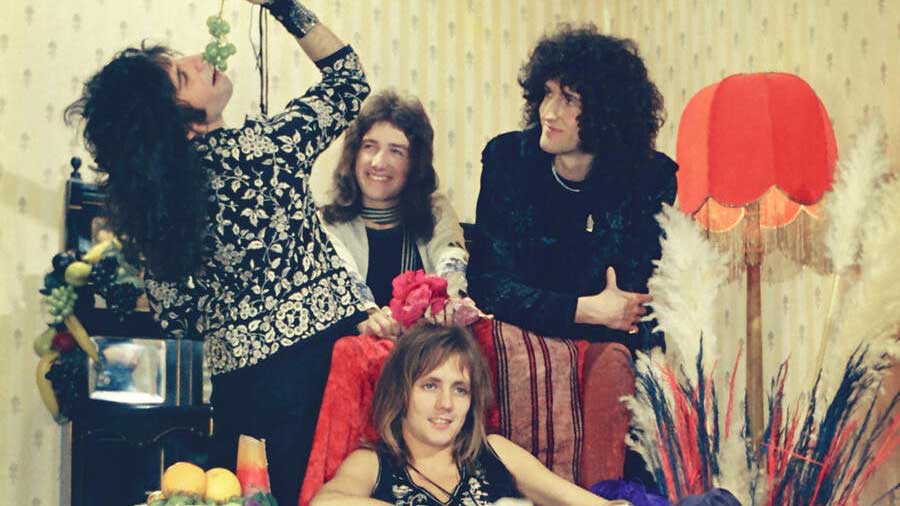
Brian May looks back on making Queen’s self-titled debut album with a mix of emotions. On one hand, the circumstances were far from ideal – they’d been forced to record it in Soho’s Trident studios by their then-managers, who owned the place, using unfamiliar equipment. But on the other hand, it was the first major step on a journey that would take them from the clubs of London to the stadiums of the world.
“Looking back on the record, I love it,” says the guitarist now. “It’s a really good statement of who we were at the time – this embryonic band who were starting to flex our muscles in the studio. And it’s always great to hear Freddie, of course, and the way he was – full of fun and laughter and innovation.”
That record has just been reissued as a lavish box set, complete with demos, outtakes and a tweaked title – Queen I. It also includes a book packed with all manner of unseen imagery, including handwritten lyrics, Roger Taylor’s diary entries and several fantastic photos, many of them taken by Douglas Puddifoot.
“Dougie was a friend of a friend,” says May. “He was a BBC cameraman at the time, but his hobby was photography and he got into the habit of coming to shows and taking pictures of us. We have shots from Dougie right back to when Roger [Taylor, drummer] and I were in Smile.”
The photos of Queen in the early seventies capture the intimacy of the band on the cusp of fame. “We look so young,” says the guitarist as he prepares to take a trip down memory lane. “We were so young.”
The Queen I Collector’s Edition Box Set is out now.

The Marquee, December 20, 1972

“Freddie was always a rock star in his head from the time I first met him, even when he was living at home with his mum and dad. He felt it in his bones. In his mind, he was always this great god onstage, so that’s how he thought and behaved. I had this awareness that he was going to become more than just our singer – he was going to become our frontman, almost like the figurehead you have on a ship. He was what people would see first.
“When I found this picture of him in the spotlight, in this very iconic pose, I thought, ‘That’s what we should use on the cover of our first album. Rather than put the four of us on the front, we should have Freddie as our emblem.’ So I got another photo of a spotlight from the same show, and took that photo and enlarged it, then got this one and got the scissors, scalpel and glue and arranged it all, and we had our cover. I always thought it looked like a comet, which was an arresting image.”
The Marquee, unspecified date
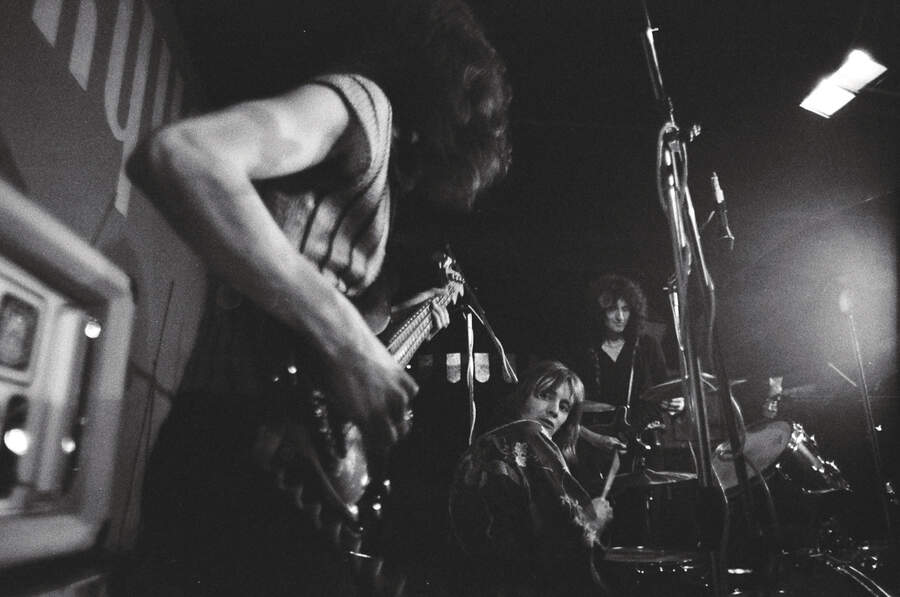
“I met Roger through a friend who went to Imperial College. I’d advertised on the noticeboard for a drummer who could play like Ginger Baker, Mitch Mitchell and Keith Moon, and Roger had heard about it and got in touch: “Yeah, I can do that, let’s meet up.”
“We met in the Imperial College jazz room. The first thing he did was tune his drums. I’d never seen anybody do that. The people I knew just hit them, so that was new to me. And as soon as he started playing, I thought, ‘Wow, I haven’t heard anybody play like this, ever.’ I plugged in with my home-made guitar and immediately it just worked – it sounded like an orchestra.
“You can see in this photo just how in contact we were, and with John [Deacon] too. We were so good at reading each other and feeling what was in each other’s minds. That continued all the way through to Wembley Stadium in 1986 – it was this wonderfully flexible machine.”
The Marquee dressing room
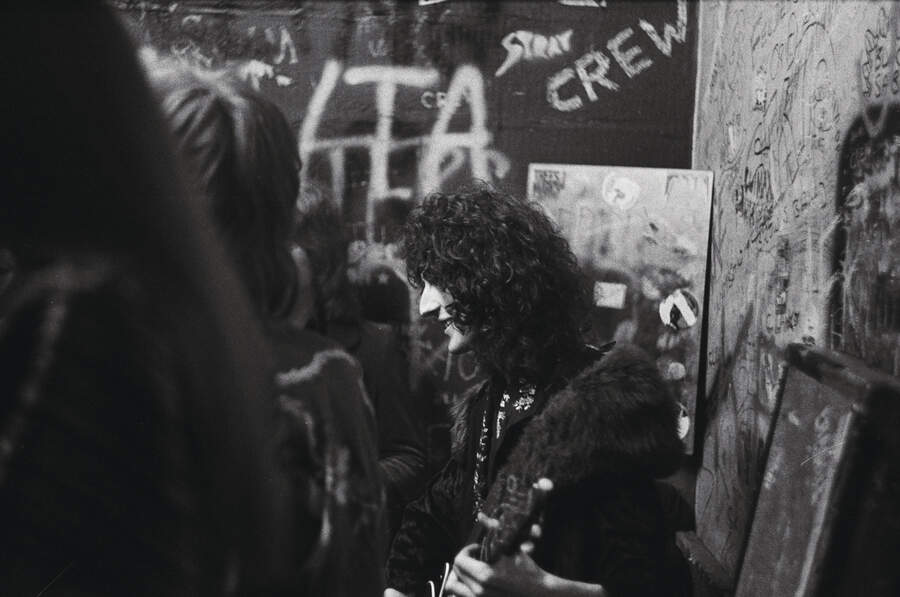
“That’s the old dressing room of The Marquee. You basically walked offstage, through a door and you were there. It was cramped and smelt of many years of stale beer, but there were all these scrawls and doodles on the wall from the people who had played there: Jimi Hendrix, Cream, Yes. It was such a thrill to be there.
“The Marquee was a place we knew incredibly well as punters. I’d seen Rory Gallagher and Taste there many times, we used to go and see The Nice there. But actually getting a gig there ourselves seemed to be impossible. John Gee, the guy in charge, was an unattainable person, just in this other universe. You needed to have a record out to play The Marquee, but you had to play places like The Marquee to get a record deal. It was this catch-22 situation that we were on the wrong side of.
“I can’t remember how we finally got a gig there, but when we did it was incredible. It felt like we were stepping on hallowed ground. All our heroes had played there. We felt energised playing that place.”
Imperial College, June 1970
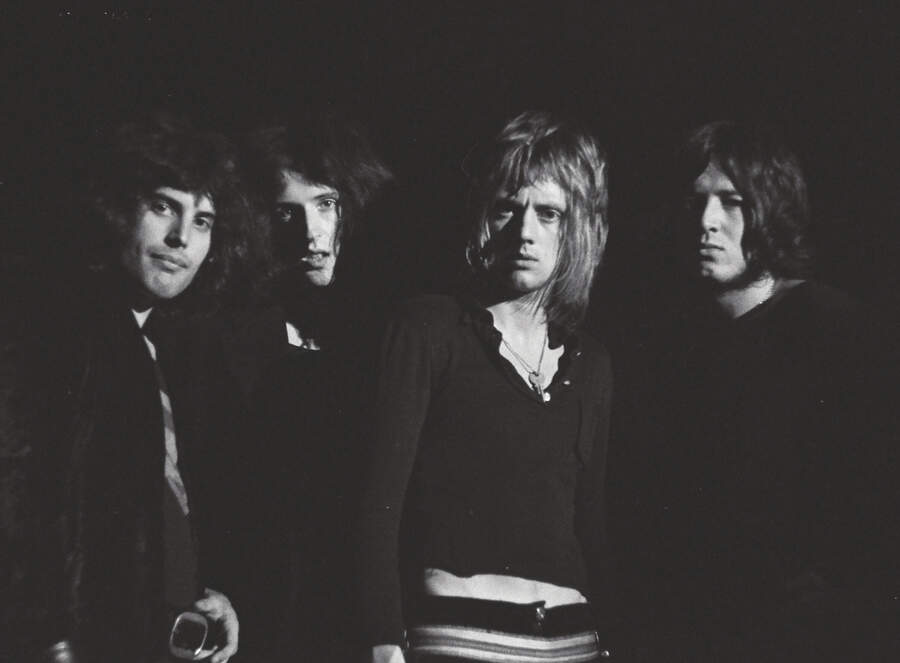
“That’s taken in the Mechanical Engineering building in Imperial College, where I used to rent the space for us to rehearse every week. The guy on the right is Mike Grose, our very first bass player. Mike was a big guy with a big sound, almost like John Entwistle – very broad and sharp, but also very deep. But musically, it didn’t quite click. It gradually became apparent that we weren’t on the same page, and it fell apart. I don’t think we sacked him, we just agreed that it wasn’t really working.
“It was very difficult to find a bass player who fitted with us. We played with some good musicians, but none of them really clicked. We eventually found John much later, through a friend of a friend. He didn’t really audition, he just set up and played. He had the right feel and the right sound, and he was easy to get on with. We just took it for granted that it was going to work. And it did.”
The Marquee, unspecified date
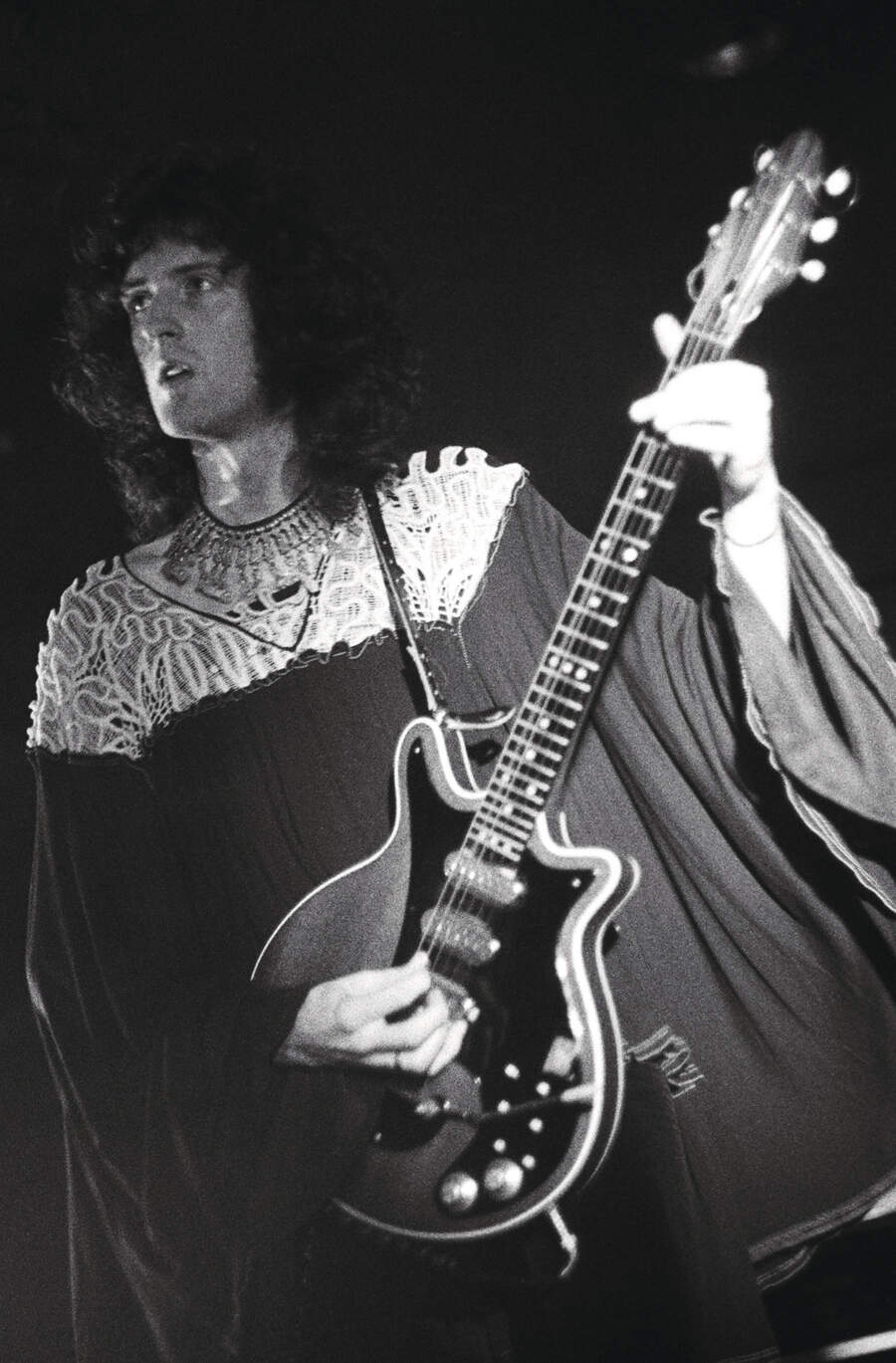
“That top is from the first bunch of costumes that [designer] Zandra Rhodes made for us – that embroidery is all hand-done. She was the original Bohemian. She was making a name for herself at the time, and we went round to what she called her “factory” in Bayswater – it was actually this tiny little house where she was cutting and sewing, and she and her team were all creating these wonderful, outlandish new designs.
“On one level, we were massively confident and ambitious back then. We had this precocious belief that we must be better than everyone else. But on another level, you’re thinking, ‘Oh my god, are we really good enough? Are we going to get anywhere? Does this mean anything?’ And in a weird way, that never really goes away. Even now, I still feel it. You’re always wondering that if, underneath it all, you’re really a bit crap.”
Imperial College, London, June 1970
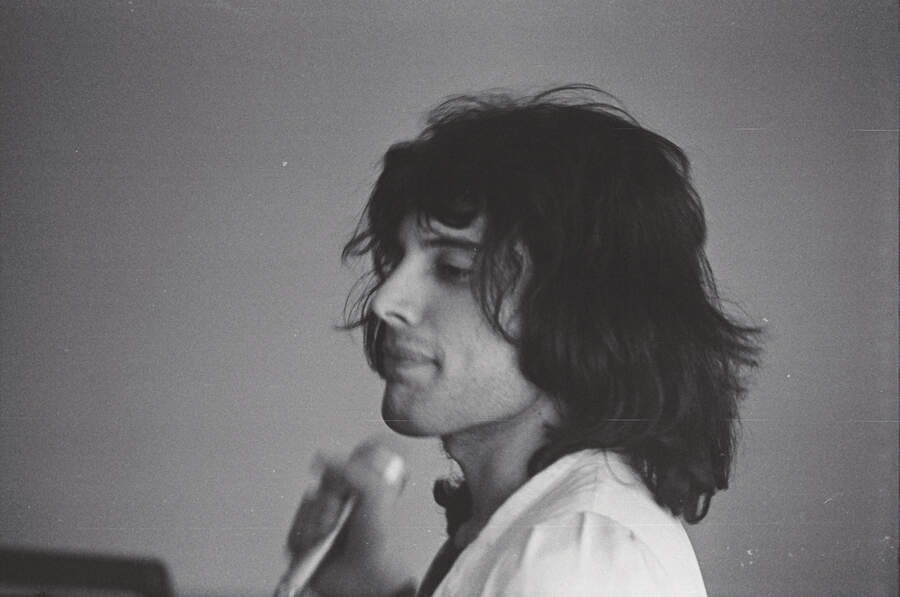
“That’s an early rehearsal. When I see that photo of Freddie, I think of how shy he was underneath all the bravado. He was shy that his skin wasn’t right, shy that his teeth might be too big. On one level, he was a supremely confident person, but he had this other side to him. You find that in a lot of performers, myself included. The reason we perform is so we can overcome that shyness. We’d try to keep our confidence when we were getting torn to bits in the press, but we’d feel it.
“What Freddie wasn’t in those early days was the singer that he became. He was always a showman, but his talent, both in the studio and onstage, grew massively in those first few years. But he became the star that he wanted to be quite rapidly.”
Pat and Sue Johnstone, late 1973
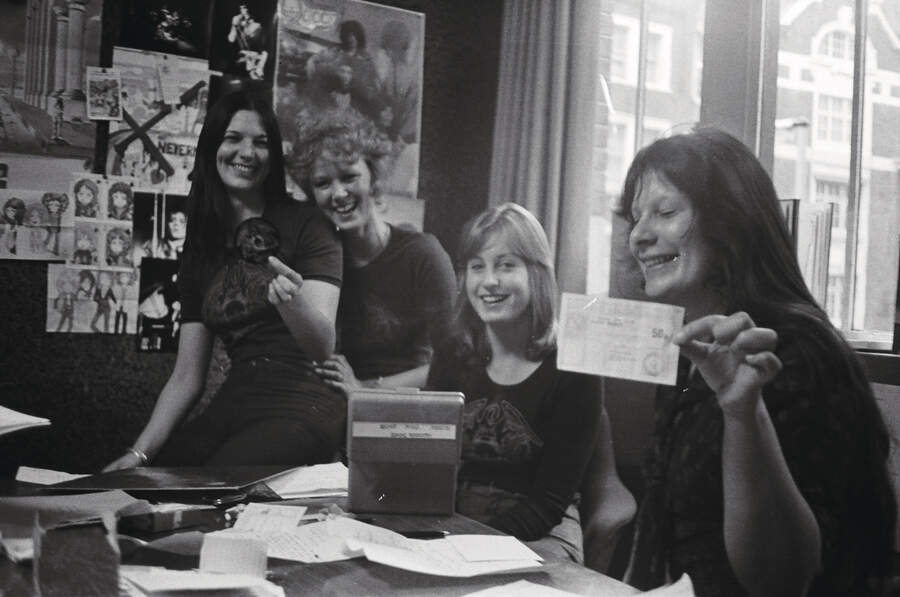
“The two ladies on the outside are Pat and Sue, who started the Queen fan club – Sue is on the left and Pat is on the right. They were mates. We used to hang out in Cornwall with them. They were singers too, in a folk group, and we used to go to the caves in Polperro and sing harmonies. They said they’d like to create a fan club and run it, which they did. Behind them, you can just about see one of the very first posters we ever made.
“The fan club is still going today. Our fans have been incredibly supportive over the years, more so than other bands, I think. They stuck with us when we took strange excursions. We Are The Champions and We Will Rock You were written because we realised the audience were as a big a part of the show as we were –we wanted to give them places to participate.”
The Winnebago, unspecified date
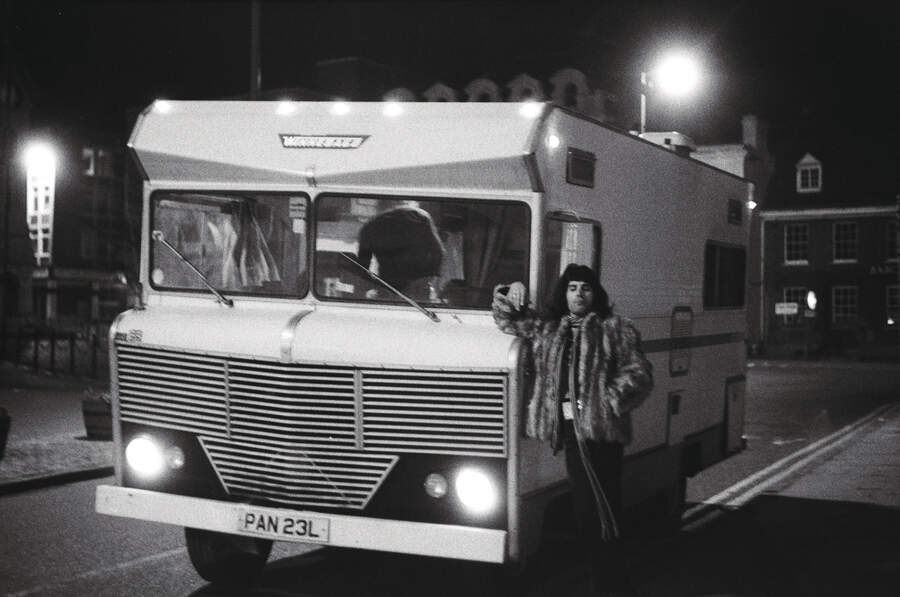
“That’s the Winnebago we rented on our first tour. We started off with the grand idea that we’d travel in it and sleep in it. The sleeping in it didn’t last very long – it wasn’t comfortable and we ended up getting hotels for the night.
“But we schlepped up and down the country in it. We were in that place of getting to know each other, talking and planning. It was fun and exciting. We were all together.
“And of course, there’s Freddie in his very glamorous-looking fur coat that wasn’t very glamorous at all. It was a real moth-eaten thing that I think he’d failed to sell in his little shop in Kensington Market.”
Imperial College, November 2, 1973
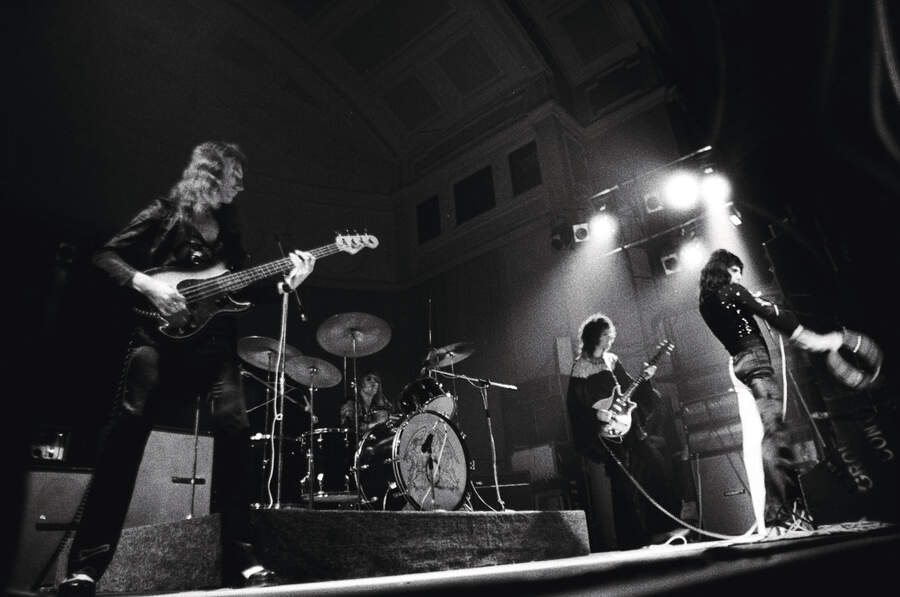
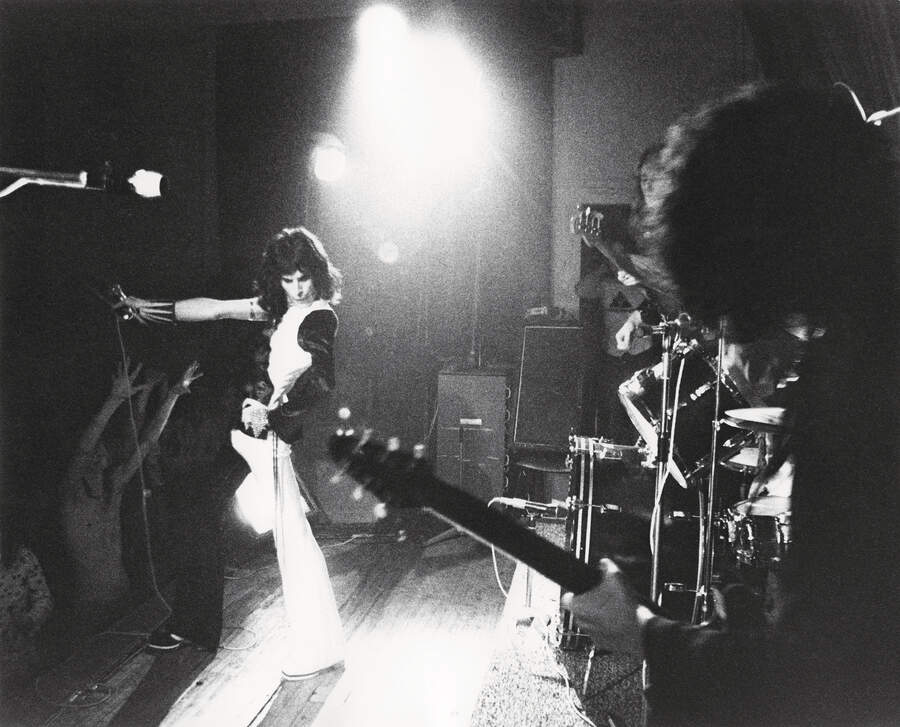
“It was hard for us to get gigs at the start, but Imperial College was a place we had access to because I studied there. In the beginning, with [pre-Queen band] Smile, we used to play in the refectory during people’s coffee breaks, and later one we’d play in the Great Hall – we’d be on the bottom of the bill, opening for bigger bands.
“These photos were taken in the Great Hall. It looks huge, but the place was tiny. You could just about cram in one thousand people but they’d be standing shoulder to shoulder. We’d played there before. The album had just come out at that point and there was a buzz out there. People were starting to hear our songs on the radio, John Peel had picked up on us, and suddenly we were getting energy from outside of our circle of friends. People were aware that something was going on and they might like it. That gig was a giant step for us. It really did feel like something was starting to happen.”
Freddie Mercury’s flat, Holland Road, London, March 17, 1973
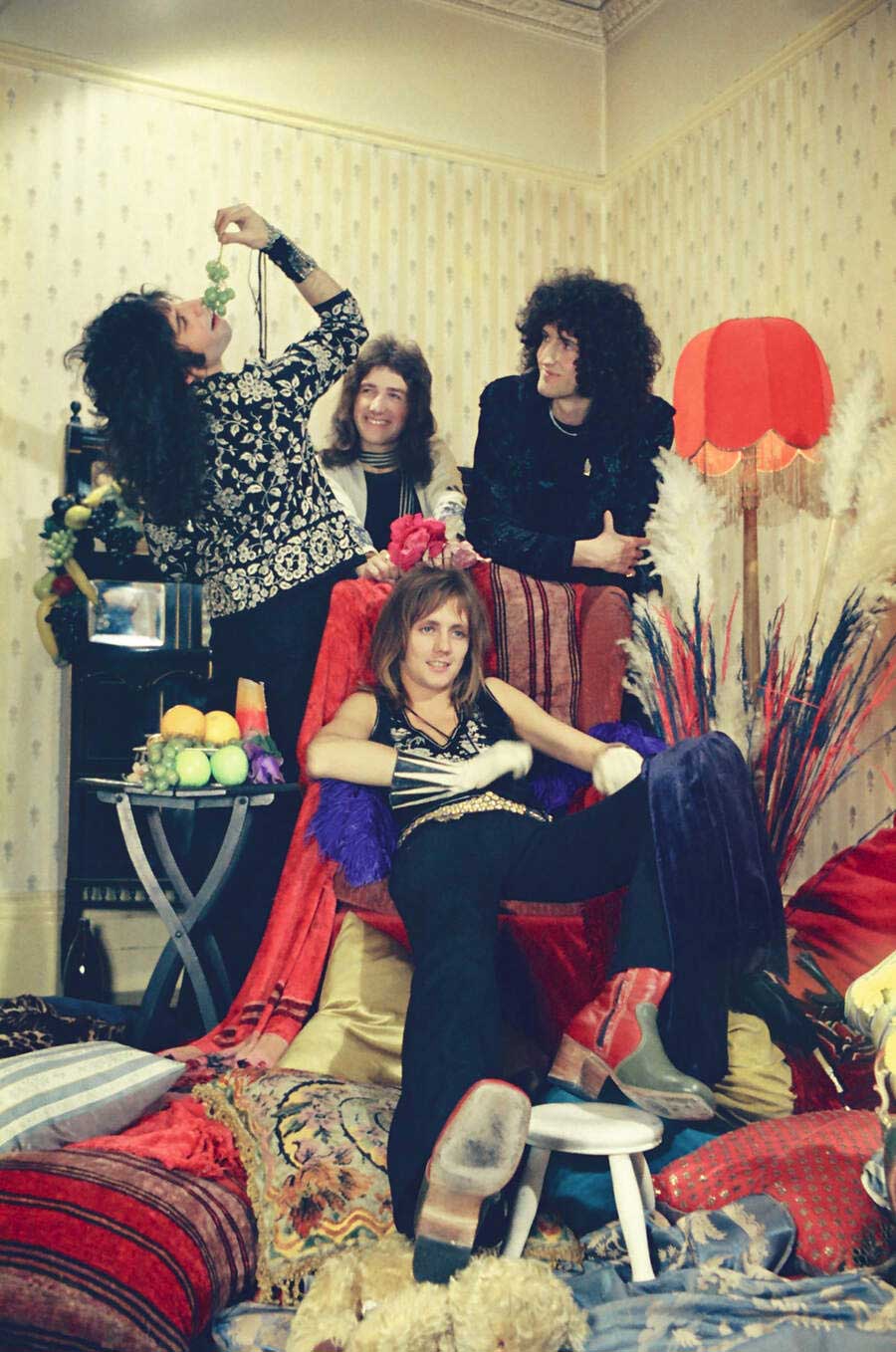
“That’s taken in Freddie’s flat. He lived there with Mary [Austin, his girlfriend]. It was our first proper photo shoot. We got everything we could together that we thought would exude this kind of period glamour. It’s mainly from Biba, which was this beautiful store in Kensington High Street, very trendy, very much harking back to the glory days of the 1930s. Mary was the manageress in Biba, so we got to borrow all this fantastic stuff, because there’s no way we could have afforded it. I actually asked Mary out at a certain point. And then Freddie went, ‘Oh, is she with you? I’d like to ask her out.’ I said, ‘I think you should, because we’re only friends really.’ And the rest is history.”

Very good written article. It will be beneficial to everyone who employess it, as well as myself. Keep up the good work – looking forward to more posts.
Hey just wanted to give you a brief heads up and let you know a few of the images aren’t loading correctly. I’m not sure why but I think its a linking issue. I’ve tried it in two different internet browsers and both show the same results.